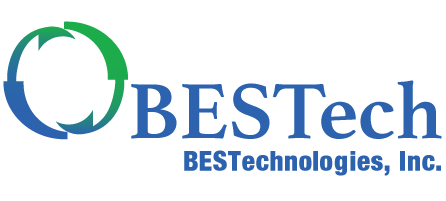Glossary
Aerobic — Oxygen requiring. Aerobic bacteria need oxygen to reproduce.
Anaerobic — (alternate spelling anarobic): Anaerobic bacteria are not dependent on oxygen, and may die or become inactive in the presence of oxygen.
Bacteria — Plural of bacterium.
Bacterium — Singular of bacteria.
Bioaugmentation — A process that enhances the performance of indigenous bacteria through the addition of bacterial strains that have a specific bioremediation trait, for the general purpose of improving overall system effectiveness.
Biological — Of, relating to, caused by, or affecting life or living organisms.
Bioremediation — A process that uses naturally occurring or genetically engineered microorganisms such as bacteria to transform harmful substances (such as grease in wastewater) into harmless or less harmful substances.
Bladder bag — Triple-layered Mylar bag in which freeze-dried bacteria are contained for use in BESTech’s restaurant and sewer dosing systems.
BOD (Biochemical Oxygen Demand) — The oxygen required to degrade organic wastes suspended in water; an indication of the organic waste content of wastewater.
Caustic — Capable of burning, corroding, dissolving, or eating away by chemical action.
Consortium (when referring to bacteria) — Multiple bacterium strains combined to undertake a task beyond the capability of any one bacterium.
DO — Dissolved Oxygen Measuring the amount of Oxygen ia a sample of water is an indicator of the condition of the water.
Dosing Material — Refers to any material being used for remediation purposes.
Effluent — Liquid discharged as waste, for instance from a factory or sewage works.
Enzyme — A protein molecule produced by living organisms that catalyze other substances without itself being destroyed or altered upon completion of the reactions.
Enzymes — Complex proteins which are produced by living cells, including live bacteria, and which catalyze (modify and increase) specific biochemical reactions. Some biological drain cleaners consist only of enzymes. Enzyme-based products do not form colonies in drain lines, have very short shelf lives and tend to be less effective than BESTech Biofeed®, which contains live vegetative bacteria.
FOG — Fats, Oils and Grease
Glycerol — An organic molecule; a syrupy substance usually obtained through the saponification (conversion) of fats.
Grease-Interceptor – BESTech’s definition – having a capacity of at least 750 gallons.
Grease-Trap – BESTech’s definition — A device designed to retain grease from one (1) to a maximum of six (6) fixtures (only four (4) if one of them is an automatic dishwasher).
Hydrate — In organic chemistry, a hydrate is a compound formed by the addition of water or its elements to a host molecule.
Lipid — The class of substances that includes animal fats and vegetable oils.
Microorganisms — An organism that can be seen only with the aid of a microscope and that typically consists of only a single cell. Microorganisms include bacteria, protozoan’s, and certain algae and fungi.
Non-pathogen — The opposite of Pathogen.
Pathogen — Disease causing.
Proprietary — Owned by a private individual or corporation under a trademark or patent.
P-trap — A short section of drain line, somewhat resembling the shape of the letter P, where a small amount of liquid (usually water) is “trapped”, forming a barrier to prevent odors from escaping from the Drainline and into a facility.
Remediation — The act or process of correcting a fault or deficiency.
Retention Time — This term, when referring to bioremediation, refers to the amount of time the wastewater can be held for treatment before is escapes the area where dosing material is being added.
Spore-formers — Bacteria which can survive under adverse conditions by entering a restive, protected state, and which can reawaken when environmental conditions improve. When included in a consortium of live vegetative bacteria, they can increase the grease-degrading ability of the product. However, biological products consisting of 100% spore-formers may be flushed through drain lines without reawakening, having little or no effect.
Triglyceride — A lipid in which three fatty acids are attached by one glycerol backbone.
Vegetative bacteria — Are those bacteria or micororganisms that can grow or reproduce in rich, moist soil where many nutrients are available.
Wastewater — Water that has been used, as for washing, flushing, or in a manufacturing process, and so contains waste products: sewage.

